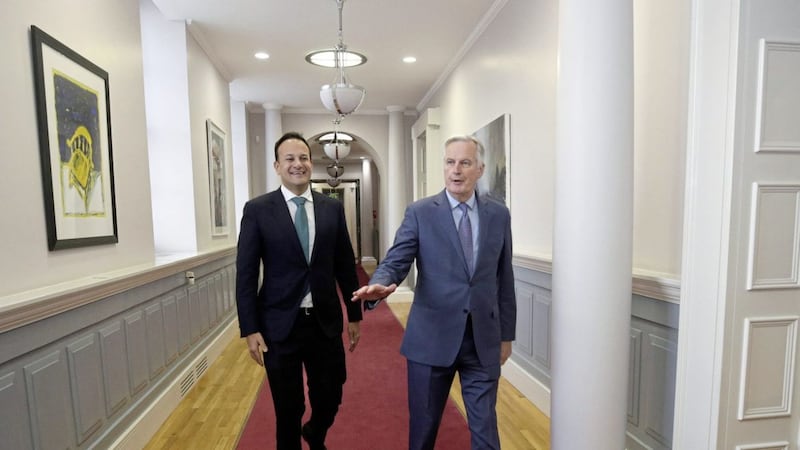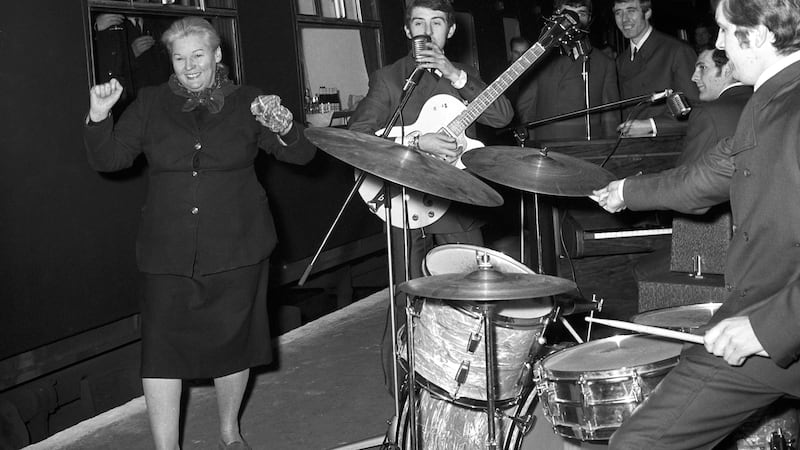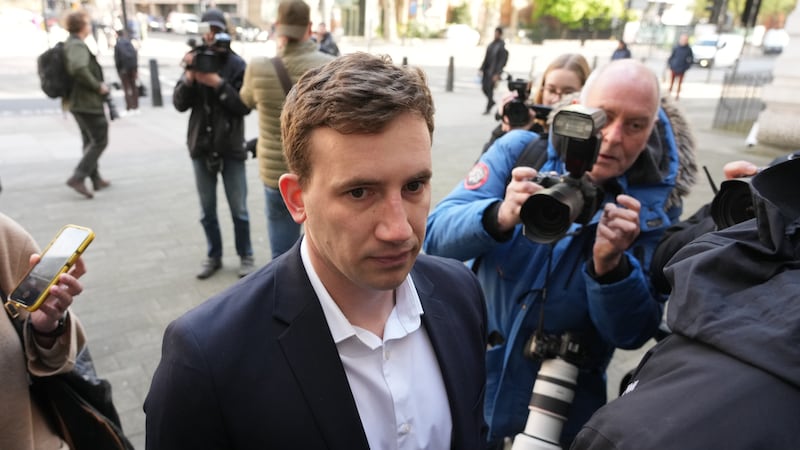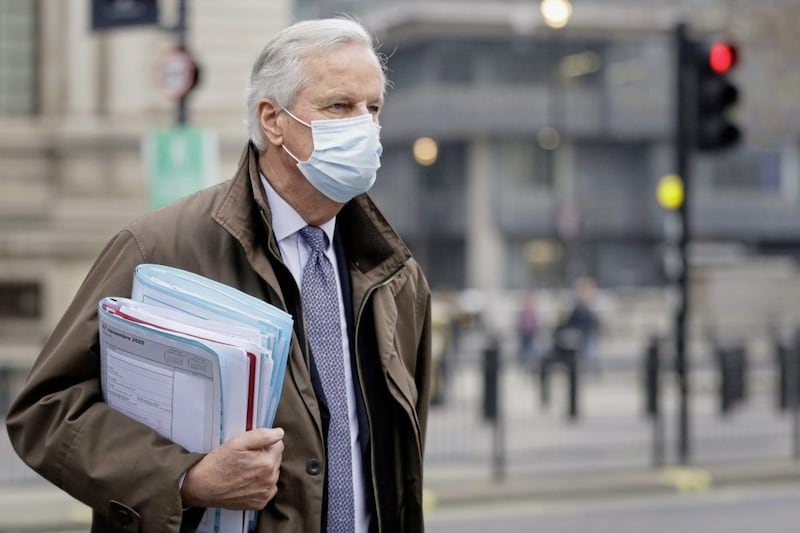Negotiations on the UK and EU's future relationship does not have to be a contest with winners and losers, the taoiseach has said.
Leo Varadkar has made clear there will always be a place for the UK at the EU table if Brexit does not work out well.
After a meeting EU chief negotiator Michel Barnier in Dublin, the taoiseach said it was important that the remaining member states continue to be united as "Team 27" in the next phase of negotiations with the UK.
"On Friday, the United Kingdom is leaving the European Union, we'll say goodbye to an old friend embarking on an adventure," he said.
"We hope it works out for them. But if it does not, there will always be a seat kept for them at the table."
Mr Varadkar said he was "ambitious" about the future EU/UK relationship but warned there was also a need for "realism".
"We need to start a new relationship between the EU and the UK on a firm and honest footing," he said.
"And that means a level playing field. This is very much in Ireland's interests, as well as that of the European Union as a whole."
The taoiseach highlighted that the Withdrawal Agreement had ensured there was no hard border, free movement on the island of Ireland had been maintained and citizens' rights protected.
He said achieving a trade deal by the end of this year would be "very challenging".
"Time is short and a negotiating mandate will be agreed at the EU Council in March, but we're up for it," he said.
"And we agree [himself and Mr Barnier] that it's important as ever that we enter the next phase united and in a positive spirit, and we do."
Mr Varadkar said the second phase of Brexit will be different to the first.
"In the first phase, there were three very definite objectives. Protecting citizens rights, EU citizens in the UK and UK citizens in the EU, financial settlements and making sure that the specific issues to Ireland were looked after and that's all been done," Mr Varadkar said.
"This phase is different. There isn't a separate objective related to Ireland. But I think our influence will remain strong, relationships have been built up over the past two or three years.
"We will certainly work as a government to make sure that the other member states continue to understand the unique concerns that we have because of our history and geography and the fact that our economy is so intertwined with that of Great Britain.
"But we will also understand that other countries in the European Union too have unique interests, and the best way that we can get the best outcome for every EU member state is for us to pull together those interests, and make sure that they're part of the negotiating mandate which will agree at the European Council meeting at the end of March."
Mr Barnier said the Withdrawal Agreement would not have been possible without the unified approach of people and politicians in Ireland. He singled out Mr Varadkar and his team for particular praise.
"So the moment has finally come – the UK leaving the EU on Friday," he said.
"Thankfully, it is leaving with a deal. It was not easy to get here. Over the past three years we negotiated respectfully, openly and fairly with the UK to ensure that it leaves the EU, our union, in an orderly manner. To ensure that the rights of our citizens are protected and to ensure peace and stability on this island.
"We now have a withdrawal agreement that brings legal certainty. And I wanted to make one point about this today. It certainly wouldn't have been possible to reach this agreement without the hard work, passions and unity of everybody here in Ireland."
Thanking politicians in the Dáil and the civil servants, he said: "And I want to thank you, Leo, for the leadership, for the courage you have shown throughout this negotiation, in particular in the last few months at the end of last year.
"What Brexit really showed that for us in Europe it doesn't matter whether you are big or small. We are all part of a family."
Mr Barnier said he would present a draft negotiating mandate to the EU member states next Monday.
"Brexit is not going to go away," he said.
"We have some important work ahead of us. The protocol of Ireland/Northern Ireland now needs to be implemented in all its dimensions – we will watch over its implementation very closely.
"We also need to begin negotiations on our future relationship – an ambitious relationship with the UK. It's time for round two and time will be very short. We will maintain the EU unity, and we want to find an agreement that works in the interest of the whole EU."
Mr Barnier added: "The level of access for the UK and particular for the UK products to the single market will be proportionate to the level of commitments taken by the UK vis-a-vis our rules in particular for the state regulations.
"It's time for the second [Brexit] round. This time it is very short, [we] have no time to lose in any politics.
"I always worked with everybody in UK with respect and I will continue."
Mr Varadkar said negotiations on the future relationship did not need to be a contest.
Asked about his comments that the EU would hold the upper hand in the talks, the Taoiseach said: "Ireland will be friends to the United Kingdom into the future, we want to be friends with our nearest neighbour.
"But there should be no doubt that we are on 'Team EU', we are part of the 27 and maintain solidarity with all the member states and European institutions that showed solidarity with us over the past two or three years.
"I think if you see this as a contest, the European Union is in a very strong position – we're 27 countries, we have a population of 450 million people and the single market is the largest economy in the world.
"But I don't think we have to see it as a contest. There is a possibility for us to work together with the United Kingdom over the next few months and come to a future relationship and a trade agreement that's mutually beneficial and that's the spirit in which we will be entering these talks."
Mr Varadkar went on to deny that he used the words "upper-hand" in an interview with the BBC on Monday morning.
"I think I used the term strong hand rather than upper hand, I think upper was your word but anyway. I won't be semantic."
He went on to say that he was relieved that "round one" of Brexit was over.
"I'm also saddened as well that the UK is leaving the European Union but we respect that a decision has been made, but also optimistic about the future," he said.
"I do believe it is possible for us to build a very close partnership, political, economic and on security too and I'm committed to doing that."
Asked about the forthcoming general election, Mr Barnier said a change in government would not impact his working relationship with the Republic.
"I will work with the government chosen by the citizens," he said.
Mr Barnier said the EU is not ready to ask for concessions nor ready to give concessions.
"The UK is leaving. It is their choice, it is not our choice. We have to first of all organise this orderly Brexit," he said.
He added that if no agreement is reached by the end of the year it "cannot be business as usual".
"We are to face a risk of a cliff edge, in particular for trade," he said.
"We will use this time maintaining our line, protecting our interests, our principles and always willing to build the strong and ambitious partnership.
"The UK is there as a friend and an ally for our common security and economic partners."








